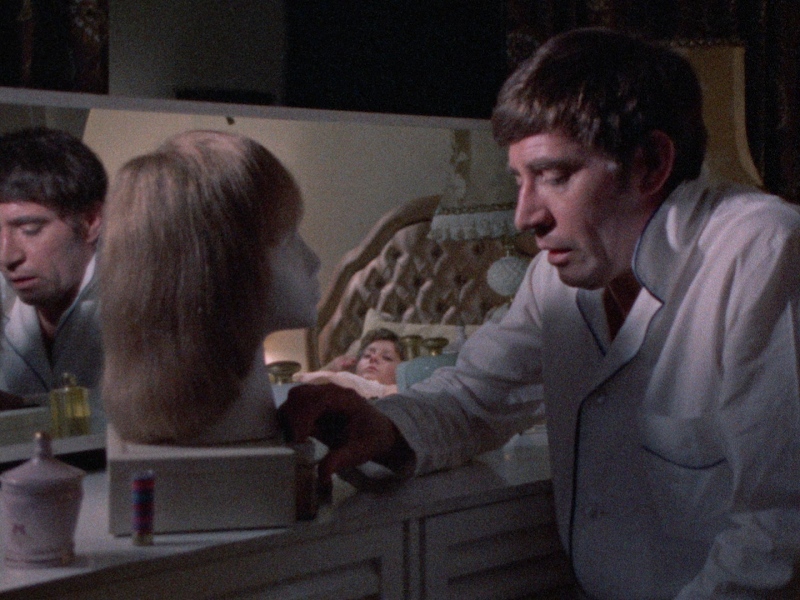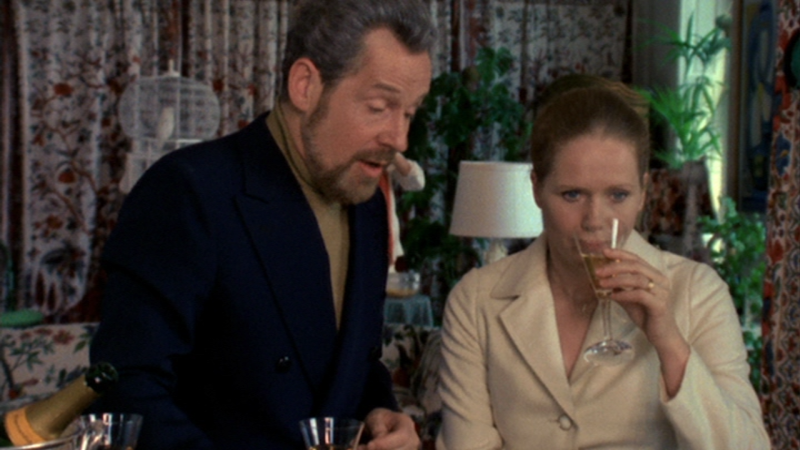Update 10/3/22 - 2/25/24: Well, thanks to Imprint's new Face To Face blu-ray edition, now only one of these are DVD-only. Can we make it zero? And release all of Bergman's remaining films? Hopefully, but today let's just be happy about Face To Face.
In 1970, Bergman wrote an original feature length film for Swedish television called The Lie, directed by Jan Molander, and starring one of Bergman's greatest actors, Erland Josephson, about a middle class couple hopelessly trapped in a mass of deception. If the made-for-TV aspect makes it sound less interesting, remember some of Bergman's most acclaimed and beloved works were made for Swedish television, like Fanny & Alexander and Scenes From a Marriage (both also with Josephson, by the way). Sounds like something you'd like to see now, huh? Well, tough noogies; you can't. It's another on the very long list of Bergman films never released in an English-friendly capacity, or even really as a Swedish-only release, apart from its televised broadcast.
However in America, Bergman's same script was adapted into an English-language television film starring George Segal, Shirley Knight and Robert Culp. Ah, but no, you can't get that one anywhere either. BUT, also during that time the BBC adapted the very same screenplay for British television, starring Gemma Jones (Sense & Sensibility, The Devils) and Frank Finlay (Lifeforce, Dennis Potter's Casanova). The performances are powerful and nuanced, the director seems to be making deliberate nods to Bergman as a director (like all those mirror shots), and the writing is some of Bergman's strongest. Only the music seems out of place, like BBC library stock stuff; but even that's not bad, just incongruous. And this version of The Lie actually IS available. And this version won a BAFTA, so we shouldn't feel too short-changed. It's on blu-ray as part of the BFI's first volume of its Play for Today box sets from 2020.
 |
| 2020 UK BFI BD. |
The only extras are an image gallery and an 80-page full-color booklet, and of course the other seven Play for Today episodes, which range from good to great. There's one on the troubles in Ireland that struck me as much more compelling than Branagh's Belfast which came out around the same time as this set, and a creepy horror story called A Photograph. So I can understand a Bergman fan being frustrated they can't just buy The Lie by itself, but the whole set is worth having in your collection.
Next up is a proper theatrical film (although there was an extended television version released afterwards) written and directed by Bergman: 1975's Face To Face. Bergman and star Liv Ullmann were both nominated for Oscars for this picture, so again, it's not like it's all lesser work that's been neglected on blu. This one's a pretty harrowing tale of mental illness, with Ullmann as a psychiatrist whose problems run as deep as her patients'. She takes on a lover, Erland Josephson again, who proves to be a far more loving companion than her own husband, and Gunnar Bjornstrand appears as her aging grandfather. This one's pretty dark, and relatable despite risking going over the top at more than one point. And it includes some of the most believable and heart-wrenching dream sequences committed to cinema, making those famous Wild Strawberries bits feel like trivialities.
Face To Face had only been available (English-friendly at any rate) as a 2011 barebones DVD from Olive Films, though at least it's anamorphic widescreen. I remember some controversy when it was released, because people felt Olive acquiring the rights cut off Criterion from giving this a proper restoration, and possibly both cuts. But of course it's pure speculation that they would've done that, and certainly getting this disc was better than the other possible alternative: nothing. But now we don't have to choose between a DVD or nothing; we have a brand new blu-ray edition (also of the theatrical version; the extended TV cut is still unavailable anywhere) from Via Vision's Imprint, due out this Wednesday.
 |
| 2011 US Olive Films DVD top; 2024 AUS Imprint BD bottom. |
Imprint presents the film in a sharper 1.67:1, giving us more vertically, though shaving a sliver off the sides. And though the film is still on the soft side (almost looking like 16mm, though I understand it was shot on 35, so I'm guessing this was taken from a later generation element, rather than the original negatives), the film grain tell us this is a much clearer look at the film source. It certainly brings detail and edges into focus. And thank goodness, they've improved the sound. It's still not perfect... it's still excessively loud when people sit on the sofa or rustle their coats, and there's slight background hiss. But it's nothing like the static-y DVD. It's also lossless now. The whole thing's a big improvement. Oh, and in both cases, the subtitles are removable.
Olive has no extras, not even the trailer. Imprint doesn't have the trailer either, but comes in a stylish slipcase; and more importantly, they've got some impressive goodies. First up is an expert commentary by Michael Brooke, and it's damn good. A lot of "expert" commentaries and featurettes I've watched lately have been eye rollingly indulgent if not outright wastes of our time. But this guy's pretty great, very well informed, leaves no dead air, cites lots of sources and is consistently interesting. I wish other commentators would aim for this standard, even if they can't reach it every time. Also on here is a visual essay by Kat Ellinger, and similarly, I've been a little let down by some of her recent output... maybe she's just agreeing to too many projects and unable to devote enough time to them all? Or maybe she just takes a deeper interest in some films and their special features more than others? I don't know, but she nails it here. Starting off very informative and citing interesting sources, then easing into her excellently made thesis that this is an under-appreciated (including by Bergman himself) feminist work.
My only nitpick, and this is admittedly a petty one, is that she uses fake film damage, jitter and projector noise... you know, that fake "old timey" video filter that comes packaged in every free video editor. And it's like, why spoil the rare photos she's sharing in her video for a silly gimmick? There's never a good reason to degrade good footage with those cheesy filters. But again, I acknowledge that's pure nitpickery; just a little pet peeve of mine. Honestly, I might've skipped over both of these extras if I didn't feel obligated to watch them for this review, but I'm glad I gave them the chance and recommend all you readers do the same.
Finally, we end with the most underrated of the three, 2000's The Image Makers. This is another made-for-Swedish-television project, and in this case really looks it. It's all set in one room like a stage-play, which in fact it originally was, although the camera is certainly moving and cutting around. This one's directed by Bergman (and he also directed the original theatrical production) but written by Per Olov Enquist (Pelle the Conqueror), although it really, really feels like a Bergman script, to the point where I suspect he at least had a hand in rewriting it for the screen, and perhaps rather liberally. It's certainly an interesting coincidence that both this and Face To Face have an older person tell a middle-aged woman that "old age is Hell."
Anyway, it's the story of the making of the classic Swedish ghost movie, 1921's The Phantom Carriage. The author of the original film arrives at the studio to see clips of the film Victor Sjöström and his cinematographer Julius Jaenzon have made of her work. However, to complicate matters, Tora Teje, the actress having an affair with the director and who feels the leading part should have been hers, shows up at the same time and makes a scene. It's on one hand a fascinating mediation on the ownership/ creation of art - how can the author, director, actor and photographer each feel the art projected on screen is their singular vision? But it's also a powerful human drama where the making of The Phantom Carriage is really just the backdrop to a forceful study of love, heartbreak, infidelity and cruel fathers. There's a cheap shot-on-video look to the film, amplified by the staginess of the setting, that signals The Image Makers as a forgettable lesser work. But when you really settle into it, it's as moving and thoughtful a work as Bergman's greatest films.
But to date, this film has only been released on DVD in the UK by Tartan in 2008.
You may've also noticed that Tartan's release is a 2-disc double feature, and in fact the lead film isn't The Image Makers, but the original Phantom Carriage. It works as a nice supplement to The Image Makers, but as a stand-alone disc, it's not too impressive. It's somewhat window-boxed 1.32:1, interlaced, and barebones. So in an age where Criterion has released an impressive special edition blu-ray, this really isn't a go-to disc for Phantom Carriage. The reason to buy this set is The Image Makers. But it's a damn good reason.
 |
| 2008 UK Tartan DVD. |
Needless to say, all three of the releases covered above are must-haves for Bergman fans. And yes, it's very much worthy double-dipping from Olive's DVD to Imprint's BD of Face To Face. Now hopefully some label or other will see fit to continue to plumb the depths of Bergman's incredible catalog.
















No comments:
Post a Comment